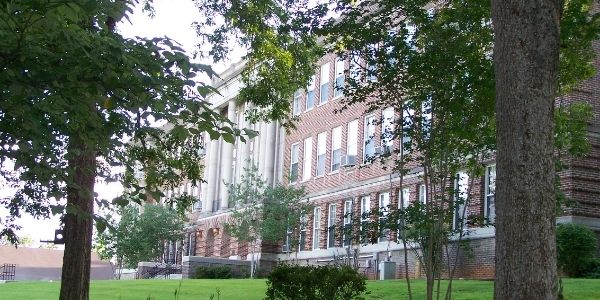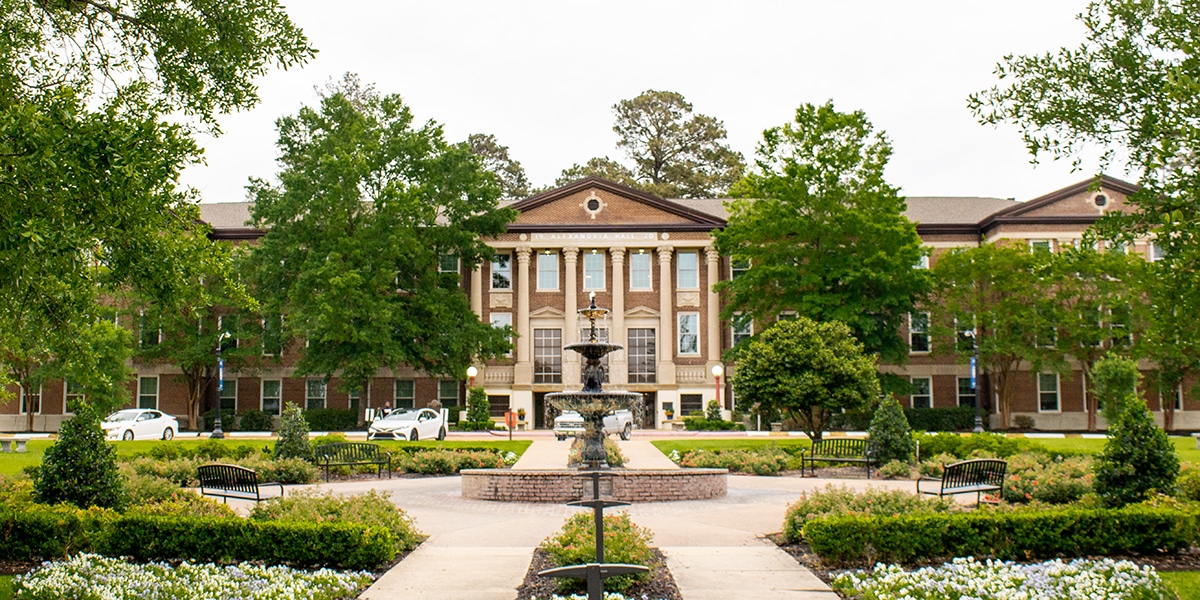What are you looking for when you consider Christian colleges? And what does that label even mean, exactly?
Christian Colleges, emphasis on “College”

In some cases, it used to describe otherwise typical colleges or universities with similar offerings and expectations to many state schools, but with extra focus on nurturing the spirit and promoting Christian ideals. These Christian colleges offer quality education with a cultural caveat – students are expected to respect and adhere to a more specific range of acceptable behaviors while enrolled.
You can prepare for virtually any calling or career at these institutions. The distinction is not about what you do so much as how you do it.
Christian Colleges, emphasis on “Christian”
Other times, the “Christian colleges” label indicates a focus on training students for ministry – be it the pulpit, at the piano, in the classroom, or on stage. These institutions offer limited degree options beyond those commonly associated with the Great Commission in the 21st century.
With these Christian colleges, you can pursue nursing, teaching, maybe some business classes or computer skills, but all roads lead back to and serve a central calling.
| Rank | School | Location |
|---|---|---|
| 1 | Clarks Summit University | Clarks Summit, Pennsylvania |
| 2 | College of the Ozarks | Point Lookout, Missouri |
| 3 | Emmaus Bible College | Dubuque, Iowa |
| 4 | Harding University | Searcy, Arkansas |
| 5 | Blue Mountain College | Blue Mountain, Mississippi |
Evaluating Christian Colleges
It’s impossible to know exactly what spiritual or social dynamics you’ll find at any school until you’re there and living it. What is possible is preview is a school’s requirements, general course offerings, and how they frame their own values and goals. Just like with any post-secondary endeavor, it’s essential to consider practical issues like cost, location, degree programs, and other logistics as well.
Nothing on this list is an effort to gage the “Christian-ness” of any of the schools herein. While we’ve only included accredited institutions which offer degree programs beyond the strictly theological, this is a matter of categorization rather than a value judgment on the right or wrong choice for any given individual. Descriptions of campus values and culture are drawn from college websites, student publications, and other subjective sources, and are included to give prospective students a starting place for their considerations and research.
We’ve ranked the schools listed below by considering average annual tuition (lower is better) and graduation rates for full-time students (higher is better). When two or more institutions tied, student-to-faculty ratio served as tie-breaker.
Clarks Summit University
Clarks Summit University is a moderately sized university offering more than fifty different undergraduate programs both in person and online. Offerings include the full range of ministry-related majors as well as several more traditional options (liberal arts, sciences, education, business, etc.) Clarks Summit offers a popular double major combining a student’s chosen career pathway and Biblical studies. The option appropriately reflects the university’s larger dual priorities – practical, quality career preparation and a meaningful, Christ-centered life.
School Overview
College of the Ozarks
The College of the Ozarks offers a surprisingly diverse and rich selection of courses alongside its theological options. The priority, as their mission statement puts it, is to “provide the advantages of a Christian education for youth of both sexes, especially those found worthy, but who are without sufficient means to procure such training.” There is one substantial catch, however. Admissions heavily prioritizes students from the Ozark Region – mostly Arkansas and Missouri, along with select counties from Illinois, Oklahoma, and Kansas.
School Overview
Emmaus Bible College
Emmaus Bible College is a small school in Dubuque, Iowa. It offers a limited but practical range of traditional majors alongside a wealth of theological and ministry-related coursework. The “secular” options are those which mesh most naturally with a life of service or ministry (nursing, education, etc.) or which support different aspects of ministry as a career (counseling, intercultural studies, etc.). As their numbers suggest, Emmaus prioritizes personal relationships and mentoring students. The overall flavor is closer to that of a Bible College (one designed exclusively to prepare students for ministry) than a four-year university which just happens to have a religious foundation.
School Overview
Harding University
Harding University is in Searcy, Arkansas, an hour from Little Rock and less than two from Memphis, Tennessee. Harding is one of the largest schools on this list and offers more than a hundred different majors and minors. Harding’s roots are in the Church of Christ. In terms of campus culture, this means they seek to balance personal integrity and uprightness with grace towards others and a healthy diversity among the student body. All-in-all, Harding offers many of the advantages of a large, traditional university while still promoting the values and cultures of people of faith.
School Overview
Blue Mountain College

Blue Mountain College in Mississippi strives to make quality education accessible to students by offering a modest range of popular majors with a wider variety of minors and a willingness to personalize the details. Although proudly affiliated with the Mississippi Baptist Convention, their focus is on preparing students for life and careers as Christians rather than on ministry itself.
School Overview
Carolina University
Carolina University (formerly Piedmont International University) has been growing rapidly over the past decade, largely through its mergers with other Christian schools. Course offerings are fairly typical for a small Christian college, with the exception of their Education program, which includes an extensive branch of deaf education, sign language, and the like. Despite their many positives, tuition is among the lowest on this list.
School Overview
St. Louis Christian College
St. Louis Christian College in Florissant, Missouri (just north of St. Louis) has the smallest student body of any school making our list. It’s very much a ministry-focused institution, but partners with Hope International University to offer degrees in business administration, criminal justice, human development, and education. Make no mistake, however – at St. Louis Christian, faith and ministry are the priority. Tuition is low and few other schools can boast a 5-to-1 student-teacher ratio.
School Overview
Geneva College
Geneva College is 45 minutes northwest of Pittsburgh in Beaver Falls, Pennsylvania. It offers an impressive range of undergraduate and graduate degree paths, and numerous specialties within each content area. In addition to education, nursing, psychology, and the like, they have a respected degree program in aviation management and administration. Geneva pulls no punches when it comes to their very conservative, patriotic theology. Their impressive course selection and numerous awards aside, they want potential students to understand that this is very much an institution of faith first and foremost.
School Overview
Samford University
Samford University is one of the larger schools making the list. Located in historic Birmingham, Alabama, it provides everything a major state university can, filtered through the standards and expectations of an institution of faith. Samford has an impressive alumni list, including dozens of U.S. Congressmen and two Supreme Court Justices. Tuition is a bit higher than many of the smaller schools, but still modest compared to other universities of its status.
School Overview
Messiah College
Messiah College in Mechanicsburg, Pennsylvania, offers over 35 graduate degrees and certificate programs. While faith is central, Messiah frames its goals in terms of a Christ-like character and mindset rather than prioritizing ministry as an alternative pathway itself. Expectations for students are anchored in attitude and community service more than attendance at chapel services.
School Overview
Indiana Wesleyan – Marion
Indiana Wesleyan – Marion is halfway between Indianapolis and Fort Wayne. It offers an impressive variety of both traditional and ministry-related course options with more than 80 majors to choose from. Indiana Wesleyan – Marion promotes their online experience more aggressively than most and actively seeks to accommodate those wishing to attend long-distance.
School Overview
Wheaton College
Wheaton College of Wheaton, Illinois, wants students who are “looking for an education that will not only teach you to think well but also to live well.” It offers 40 majors with an emphasis on the liberal arts. In addition to the standard options like nursing, education, business, or theological studies, Wheaton offers degrees in an impressive variety of classical languages, modern languages including Mandarin Chinese, urban studies, and anthropology (the same degree Billy Graham earned when he graduated from Wheaton in 1943).
School Overview
Central Christian College of the Bible
Central Christian College of the Bible is one of the smaller schools to make our list. They’re very much a school of ministry, but partner with Indiana Wesleyan University and Moberly Area Community College to offer students a blended pursuit of several traditional careers with Central’s focus on faith and effectively impacting others. They prioritize keeping tuition manageable and maintain a generous scholarship program as well.
School Overview
Taylor University
Taylor University in Upland, Indiana, offers more than 60 majors across the arts, humanities, sciences, and social sciences. They promote academic excellence and a willingness to embrace diversity and ask hard questions without fearing where they might lead. Faith is foundational to their mission but meant to be modeled more than regulated or dictated on campus. Taylor expects a great deal from its students, but those high standards pay off repeatedly.
School Overview
North Greenville University
North Greenville University is a half-hour north of Greenville and less than two hours west of Charlotte. It offers a healthy variety of undergraduate options, a respectable online selection, and numerous graduate programs. NGU provides a nice balance of traditional college experiences with the culture and expectations of a Christian university. It repeatedly ranks well no matter who’s doing the measuring.
School Overview
Calvin University
Calvin University in Grand Rapids, Michigan, offers a wealth of undergraduate programs, many of which would be hard to find even at larger state universities. It’s undergirded by the rigid commitment to intellectual inquiry and community renewal which its name suggests. The school’s ideals are derived from the Christian Reformed Church, anchored in the Apostle’s Creed but embracing modern realities as necessary in order to be of effective service. The institutional commitment to diversity and sustainability compliment their encouragement of students to “go beyond the predictable” and “grow into the life that God wants for you.”
School Overview
Mount Vernon Nazarene
Mount Vernon Nazarene in Ohio is another mid-sized school offering a comfortable range of degree options. The school’s approach reflects their Nazarene roots. Believers are called to seek holiness and become more and more like Christ each day and in every aspect of their lives. Mount Vernon strives to offer small school personal attention and connections with big school resources and credibility.
School Overview
Kuyper University
Kuyper University in Grand Rapids, Michigan, is a small school with a big presence. It consistently ranks highly among Michigan schools and offers a comfortable mix of ministerial coursework and traditional options like health, education, or business. Less common programs like Social Media & Marketing, Community Development, or Global Studies, hint at Kuyper’s commitment to applying faith in the modern world while its theological roots remain orthodox and ubiquitous in all they do. Alongside its conviction that the Bible is infallible, inerrant, and essential are statements that Black Lives Matter and social justice is central to the Gospel of Christ.
School Overview
Johnson University
Johnson University has one campus on the banks of the French Broad River in Knoxville, Tennessee, and another in Kissimmee, Florida – just a stone’s throw from Disney World and other attractions of Orlando. Both offer a reasonable selection of Associate and Bachelor’s Degrees. Johnson fosters a “youth group” atmosphere with activities like water-gun fights and Ultimate Frisbee to build community. Their belief statement opens with the insistence on “no creed but Christ” but proceeds to detail an otherwise conventional theology.
School Overview
Louisiana Christian University

Louisiana Christian University, located amongst the hills of Pineville, is a Baptist college of liberal arts and sciences with selected professional programs. It has easy access to national parks and wildlife refuges, in addition to some of Louisiana’s bigger cities, just a short drive away. The course offerings are fairly standard for a medium-sized Christian institution.
School Overview
Williams Baptist University
Williams Baptist University is in northeastern Arkansas, a half-hour from Jonesboro and about 90 minutes northwest of Memphis. It offers a healthy variety of undergraduate programs and a dozen pre-med pathways while still remaining fairly affordable and modestly sized. Its Southern Baptist roots and geographical location certainly suggest its commitment to traditional Christian values, but Williams presents itself as a quality education in a Christian environment more than a Christian school that happens to offer Bachelor’s degrees.
School Overview
Pepperdine University
Pepperdine University is one of the better-known schools to make our list. It’s located in Malibu, California, and offers degree programs more typical of Ivy League peers than smaller, faith-based alternatives. This is where you go to study law, public policy, or to secure your Master of Divinity or Doctorate in Psychology – not to get your teaching degree or nursing certificate. The cost is the highest of any school making this list, but offset by student satisfaction and the undeniable success rate of their graduates.
School Overview
Point Loma Nazarene
Point Loma Nazarene in San Diego offers over 60 degree plans for undergraduates and a healthy number of graduate degree options as well. Like many of the larger Christian colleges on this list, their focus is on preparing students professionally as well as personally – academic excellence with Christian values rather than ministry as a profession.
School Overview
Baylor University
Baylor University is by far the largest of the Christian colleges to make our list. It’s a landmark in the otherwise modest town of Waco, Texas, and offers over 125 majors and minors, as well as every conceivable activity or sport associated with a major university. It is more than nominally Christian, however, and takes very seriously its commitment to students’ spiritual and emotional well-being. If you want the full college experience while retaining the dynamics of a primarily Christian community, Baylor might be for you.
School Overview
Warner University
Warner University is an hour east of Tampa and south of Orlando in Lake Wales, Florida. It offers the usual range of undergraduate pursuits (business, criminal justice, counseling, education, and ministry) with the addition of an Agricultural Studies program of some repute in the region. Its primary affiliation is with the Church of God (Anderson, IN). Other than mandatory Chapel attendance and a commitment to model and support the spiritual journey while there, however, their faith focus seems to be similar to other Christian colleges of its size.
School Overview
Southwestern Christian University
Southwestern Christian University sits just outside of Oklahoma City in Bethany. As their Chief Academic Officer explains, SCU believes that “every student has a role in ministry. While some students seek active roles as pastors or missionaries, others find their place in ministry as business owners, teachers, or social workers…” Southwestern describes itself as “unapologetically Pentecostal” with strong Wesleyan-Arminian roots, making it right at home in most of the Midwest. It offers a modest range of the undergraduate options with flexibility in the details. It’s a small school dedicated to helping students develop big voices.
School Overview
Bethel University
Bethel University is in Mishawaka, Indiana, only a few miles from South Bend and an easy drive to Notre Dame. It offers everything one could hope for in an institution its size, plus pre-med, pre-law, and more Master’s options than expected. Bethel has a sterling reputation locally, largely due to the quality and commitment of its graduates, and epitomizes the ideal of “by their fruits you shall know them.” Their low student-faculty ratio enables the sorts of mentoring and close relationships central to most small schools, but especially important to most Christian colleges.
School Overview
LeTourneau University
LeTourneau University is nestled in eastern Texas, about two hours east of Dallas and an hour west of Shreveport, Louisiana. Despite what may seem to be its “middle of nowhere” location, Longview is a thriving community of some size and central to many oil and technology industries in that part of the country. LeTourneau was founded shortly after World War II by one of the most successful inventors and makers of earthmoving equipment. This matters because LeTourneau was a “hands-on” businessman whose faith operated the same way as his industry. The institution today is still anchored in the idea that the best way to learn is to set aside your pride and comfort and get yourself dirty by doing whatever needs done.
School Overview
Emmanuel College
Emmanuel College in Franklin Springs, Georgia, is about 90 minutes northeast of Atlanta. Founded in 1919 by the Pentecostal Holiness Church, its foundation remains proudly Evangelical and Pentecostal. Emmanuel offers the typical range of undergraduate options and a healthy selection of minors. The school takes students’ commitment to spiritual growth quite seriously, but also hosts a wealth of athletic options and activities designed to give everyone a place and build community. Emmanuel consistently ranks well by a variety of measures and is well-respected across the region.
School Overview
Oklahoma Baptist University
Oklahoma Baptist University is the pride of Shawnee, less than an hour east of Oklahoma City. Its undergraduate offerings are fairly typical – students can join the College of Fine Arts, Humanities, Nursing, Science and Mathematics, or Theology and Ministry. The success rate of graduates in passing relevant certification exams and securing employment is well above average for the state, however, giving OBU local credibility above and beyond their spiritual focus. OBU sees all student activities as supporting students’ spiritual growth, and while there are the expected chapel services and mentoring programs, they strongly encourage involvement in other activities and organizations as well.
School Overview
Conclusion
There’s no universal “right” or “wrong” way to decide which of the many quality Christian colleges out there is the best fit for you. If you’re interested in learning more about specific degree programs or schools in your area, we can help you search based on almost any combination of factors. Once you’ve narrowed your search, you can research the finalists in greater depth.
Our Ranking Methodology
We’ve taken information about annual tuition, graduation rates, and other statistics from the National Center for Education Statistics, part of the U.S. Department of Education and the Institute of Education Sciences. In the few cases in which school websites prominently featured more current information which differed from than that of the NCES, the institution’s own figures were used instead. Annual Tuition and student numbers are based on the 2019 – 2020 school year. Graduation rates were based on full-time students who began their degree program in 2013.
As indicated above, descriptions of campus values and student life are drawn from college websites, student publications, and other subjective sources. They are included to help prospective students gather general information and are in no way a judgement about the relative value or “spirituality” of any specific institution.
Problems with Your Ranking?
If you work for one of the schools we ranked and you notice an error in the information we used to rank you, please feel free to contact us and let us know so we can make a correction.
If your school isn’t on this list but deserves consideration for an updated version, please contact us today. We’re always looking for the best schools across the country, providing the best online and on-campus education for students from all walks of life, whatever their goals.


